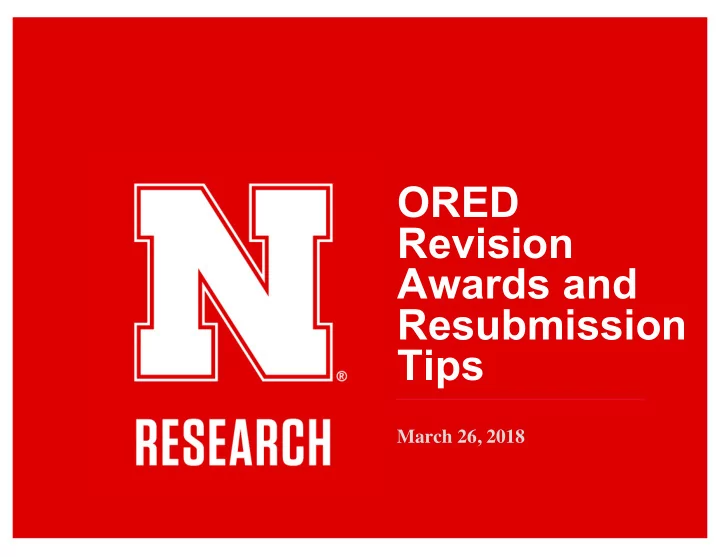

ORED Revision Awards and Resubmission Tips March 26, 2018
ORED Revision Awards Purpose • Enhance the competitiveness of UNL faculty revising and resubmitting proposals for federal funding • Developmental and/or financial support to help improve meritorious, but previously unfunded proposals that are eligible for resubmission to the same funding program Rationale • Access to expert advice and/or financial resources will enable investigators to address reviewers’ concerns in their revised application; thereby, increasing the likelihood the proposal will be funded RESEARCH AT NEBRASKA
ORED Revision Awards Award Categories • Category 1 proposals may request up to $25,000 to support revision of grant proposals requesting $250,000 – $500,000 in federal grant support • Category 2 proposals may request up to $50,000 for revision of grant proposals requesting more than $500,000 in federal grant support Project Period • No more than 12 months in duration RESEARCH AT NEBRASKA
ORED Revision Awards Pre-submission Consultation Required • Contact Nathan Meier, assistant vice chancellor for research (nlm@unl.edu or 402-472-3902) prior to submitting an application Application Process • Applications accepted on a rolling deadline • PI must provide notification of intent to submit at least two weeks prior to submitting the proposal • Application content is essentially: 1) proposal that will be revised as originally submitted along with panel review comments, 2) five-page proposal describing the planned revision, 3) budget; and 4) revision timeline RESEARCH AT NEBRASKA
General Resubmission Tips • Most grant proposals (i.e., 75%-90%) are rejected on first submission • Resubmission is an opportunity to fine tune your idea, emphasize identified strengths, address concerns, and include more relevant detail • Resubmission success rates are higher across nearly all federal agencies • Take review panel feedback seriously, particularly the summary from the program officer • Talk with the program officer – in person if possible • Make a go/no-go decision on resubmission – Can the criticisms be addressed? – Would you be better off seeking funding from a different program or sponsor? RESEARCH AT NEBRASKA
Tips for Resubmission to NSF • At NSF there is no formal mechanism for resubmission – all applications are viewed as new, so you will not have an opportunity to directly address reviewer comments • The review panel might be the same or it might not; NSF does not disclose reviewer names • NSF program officers seat the panels and most appreciate you completing the List of Suggested Reviewers, a component of the Fastlane application – think twice before suggesting reviewers not to include • Regardless, educate yourself on the likely expertise of the panel and write to that audience • Ask a colleague who has experience with NSF for advice and to review your proposal • Utilize internal resources to help you prepare the most competitive proposal possible RESEARCH AT NEBRASKA
Tips for Resubmission to USDA NIFA AFRI • READ the RFA/solicitation or check the website for guidelines! • Project Directors MUST respond to the previous review panel summary – Limit of one page--in front of the Project Narrative – Does not count against the 18 page limit of the Project Narrative – Title this page “Response to Previous Review” – Must contain previous proposal number in the first line • Discuss the Panel Summary and your response with NIFA NPL • The review panel might be the same or it might not; NIFA does not disclose reviewer names. • Revised/resubmitted applications compete with new applications • Same evaluation criteria are used for new and resubmitted applications • Ask a colleague who has experience with USDA NIFA AFRI for advice and to review your proposal • Internal resources to help prepare the most competitive proposal possible RESEARCH AT NEBRASKA
Tips for Resubmission to NIH • READ the FOA or check the website for guidelines! • NIH policy on resubmissions has evolved since 1996 • 2014 NIH policy on resubmissions (NOT-OD-14-074) • Only allowed one resubmission for each new, unfunded application • Must resubmit within 37 months of the application it follows • If resubmission is not successful, submit the idea as a NEW application • May submit unfunded, new application as NEW again (without resubmission) • Resubmitted application number will end with A1(amended) • https://grants.nih.gov/grants/history-of-resub-applications.htm RESEARCH AT NEBRASKA
Tips for Resubmission to NIH • READ the FOA or check the website for guidelines! • Include an Introduction that: – Summarizes substantial additions/deletions/changes to application • Individual changes do not need to be identified within other sections of the application (e.g., do not need to bold or italicize changes in Research Strategy) – Responds to issues and criticisms raised it the summary statement – One page or less (unless specified in FOA or on NIH website) • https://grants.nih.gov/grants/policy/amendedapps.htm RESEARCH AT NEBRASKA
Tips for Resubmission to NIH • Discuss the Panel Summary and your response with NIH Institute/Center scientific contact (not the SRO for the study section/review panel) • The study section might be the same or it might not • NIH discloses reviewer names with reviews and on website • Revised/resubmitted applications compete with new applications • Same evaluation criteria are used for new and resubmitted applications • Ask a colleague who has experience with NIH for advice and to review your proposal • Internal resources to help prepare the most competitive proposal possible RESEARCH AT NEBRASKA
Revising/Resubmitting Manuscripts or Grant Applications Three Key Things to Remember 1. It’s A Small World 2. Reviewers have long memories 3. 1st submission = good effort 2nd submission = stronger effort 3 rd submission = stronger effort, likely winner RESEARCH AT NEBRASKA
Panel: • Dipti Dev – Assistant Professor; Child, Youth and Family Studies • Samodha Fernando – Associate Professor; Animal Science • Sherri Jones – Chair, Special Education and Communications Disorders Director, Barkley Memorial Center • Matt Wiebe – Associate Professor; School of Veterinary Medicine & Biomedical Sciences & Nebraska Center for Virology RESEARCH AT NEBRASKA
Questions? RESEARCH AT NEBRASKA
Recommend
More recommend